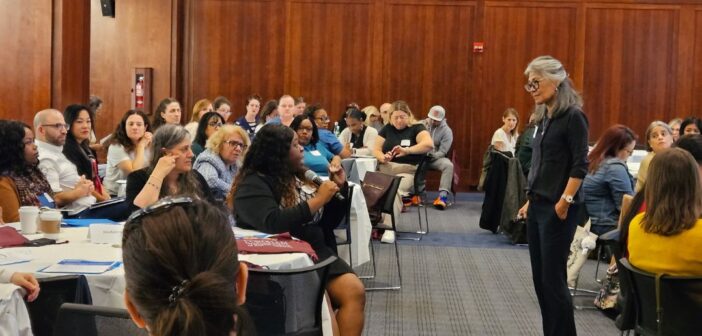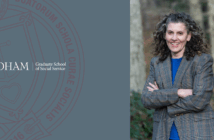In the intricate realm of caring for seriously ill patients and their families, healthcare social workers require considerable knowledge and skills. Yet, despite the invaluable role they play, there has been a notable absence of specialized training programs for primary health care social workers working with these patients.
Myra Glajchen, DSW, Director of Education and Training at the MJHS Institute for Innovation in Palliative Care, recognized the urgent need for such a program after two decades of firsthand experience working with these patients. Collaborating with experts in the field, including Fordham GSS Professor Cathy Berkman, Ph.D., and Shirley Otis-Green, MSW, LCSW, she brought the Educating Social Workers in Palliative and End-of-Life Care (ESPEC) program to life. On October 27, they conducted a transformative in-person training session at Fordham’s Lincoln Center campus for over 75 dedicated social workers from NYC hospitals.
What is Palliative Social Work?
The World Health Organization defines palliative care as “an approach that improves the quality of life of patients – adults and children – and their families who are facing problems associated with life-threatening illness.” Specialty palliative care teams consist of doctors, nurses, social workers, and clergy, and care is provided in hospitals, nursing homes, outpatient clinics, community agencies, or in the home. However, for a variety of reasons, many seriously ill patients do receive specialty palliative care and are managed by their primary care team. Social workers on these primary teams benefit from training in basic palliative care skills and evidence suggests that they are eager to enhance their ability to provide palliative care to their patients.
A Training for Social Workers, by Social Workers
With the global aging population growing into the largest sector of the population and modern medicine’s impact on allowing individuals to live longer after being diagnosed with a serious illness, these palliative care skills are in demand. Throughout her career, Glajchen was aware of palliative care training programs available to physicians and nurses, but nothing comparable was offered to social workers. In 2016, she decided it was time to fill this gap.

Glajchen (third from left) and Berkman (far right) stand with the facilitators of the day’s events.
In 2018, Glajchen, Berkman, Otis-Green, and others published a landmark paper defining the core palliative care competencies that primary social workers require. Their findings were based on a study of frontline palliative and hospice social workers, so the information was current with modern practices and competencies. Glajchen said this paper would serve as the framework for the ESPEC program.
“We wanted to make sure that we could level the playing field with our colleagues from nursing and medicine,” Glajchen said, “and that we could develop a training program by social workers for social workers.”
The ESPEC program has prepared over 300 social workers nationwide since its inception, using a mixed modality of virtual and in-person training. Those who enroll in the course receive eight hours of virtual material in ten separate modules oriented around a fictional patient narrative of a patient with advanced cancer as she goes through diagnosis and treatment. Glajchen said her team designed the course to be engaging and accessible for working professionals.
“You can take the program in one sitting, or you can do one module at a time, Glajchen said. “The program keeps your place, and the system sends you reminders, saying, You’ve done four modules, and you have six to go. For social workers who take the entire course in one sitting, they say it’s like binge-watching on Netflix.”
“ESPEC is a comprehensive program in primary palliative social work that increases the learners’ knowledge so they understand the philosophy, the approach, and the role of social workers in increasing quality of life for seriously ill patients and their families,” Berkman said.
The program also stresses that social workers can take leadership on the interdisciplinary team, Glajchen said. Health care is often skewed toward hierarchical structures, with physicians normally taking the lead. On the most dysfunctional teams, this can result in power dynamics that create a hostile working environment.
“We had somebody working at a local hospital who got his MSW from a very fine school, has 25 years of experience in the field, but says that the doctors think all he does is discharge planning, ordering ambulances and wheelchairs,” Glajchen said.
In the ESPEC course, social workers learn the skills they need to assert themselves as leaders—roles many may not have envisioned before.
“In several modules, there’s a family meeting,” Glajchen said. “The doctor gets paged and has to leave the room. The social worker says, Don’t worry, I’ll finish the meeting, and I’ll let you know how it ends. When ESPEC learners see this, they wonder Could I do that? Should I do that? That’s leadership.”
ESPEC Comes to Fordham
On October 27, Glajchen and Berkman teamed up to hold an in-person training at Fordham’s Lincoln Center campus using the ESPEC framework and principles. The event was held for individuals in the New York area who had already completed the eight hours of virtual content. Thanks to grant funding from the Fan Fox and Leslie R. Samuels Foundation and the New York Community Trust, all attendees were given scholarships to complete the online and in-person training program, with course completion resulting in 14.5 social work continuing education credit hours.
“We recruited social workers working in safety net hospitals in New York City, working in the VA, and other medical institutions where they are treating underserved patients,” Glajchen said.

Glajchen presenting in front of the day’s audience.
The in-person training consisted of a morning session dedicated to core social work skills, including conducting a palliative care biopsychosocial-spiritual assessment, the family meeting, advance care planning, and interprofessional communication. The afternoon portion focused on leadership and advocacy skills. Attendees also received exclusive access to never-before-seen instructional videos, a new Leadership Best Practice Guide, and a flash drive that contained 223 slides from the online course, 233 new slides from the October 27 course, 20 instructional videos, and six Best Practice Guides, as well as resources and references.
“The program is for the newbie and the experienced social worker,” Berkman said. “There are people working as palliative social workers who may not have had any formal training and realize they can learn something new and improve the level of their practice. It also is a way to help them think about moving into leadership.”
Glajchen noted that the program is something social workers can place on their resume as more than just a line item. She knows professionals who said the ESPEC program made the difference in their being chosen over another applicant for the same position.
“At the Social Work Hospice and Palliative Care Network (SWHPN) Annual General Assembly, there were two social workers attending who were graduates of the ESPEC program, and we had them come and speak on a panel,” Glajchen said. “Both of them were on their way to new positions, and they said they used their ESPEC training as the biggest talking point for why they should be promoted.”
Why Is It Important to Provide Quality Palliative Care?
According to Glajchen, palliative care as a sector is seeing a shortage of qualified social workers. This is a problem with an aging population: according to the US Census, in 2020, about 1 in 6 people in the United States were 65 and over. In 1920, this proportion was less than 1 in 20.
“There’s a big workforce shortage in palliative social work,” she said. “We are not training enough social workers.”

Participants listen on.
Berkman said the reason for this shortage may be due to the perception of palliative care, which suffers from misconceptions from both the general public and from some healthcare professionals. She explained that students in Fordham’s Palliative Care Fellowship are often questioned by their peers about why they are interested in something “depressing” like working with very sick and dying patients. While Berkman said this is not for everyone, those who choose this career refer to it as a calling and find deep meaning and purpose in the work.
“Many of the students haven’t had any prior experience in palliative care, but were very involved with a family member, often a parent or grandparent, who went through a long illness and died,” Berkman said. “They say, I found that so meaningful. And I want to be able to do that for other people going through this experience.”
Palliative care is more than just providing relief to mitigate physical symptoms, it also focuses on enhancing quality of life up until the final hours of life. The work is filled with moments and memories that make us realize the value of life.
“It’s about relationships and communication,” Berkman said. It is about being able to say the things that matter while there is still time, such as ‘I love you,’ ‘I forgive you, ‘Please forgive me,’ and ‘Thank you.’ Those are important things to say in your final days of life to those around you, and not everyone has a chance to do so. The palliative care team can help with those things.”
Palliative Care Fellowship at GSS
Fordham is one of the very few MSW programs in the U.S. that has a specialized training program in palliative care. Students in the on-campus program can apply for the Fellowship that takes place during their Specialist year. The centerpiece of the Fellowship is an internship in palliative or hospice care, coursework in palliative care and also grief and bereavement, and other components. “A special kind of person chooses to do this work. The students who come to me who want to do this work are a different kind of person,” Berkman, who also serves as director for Fordham’s Palliative Care Fellowship program, said. Graduates of the program are working on inpatient palliative care teams, in hospice care, and in oncology and pediatrics. “A typical graduate of the Fellowship, who is now in pediatric palliative care, said it was the most meaningful thing they’ve done because they’re truly doing something worthwhile with their life.”
To learn more about the ESPEC program, visit their website.
For more information about the Fordham Palliative Care Fellowship, please visit or contact Cathy Berkman at berkman@fordham.edu.



